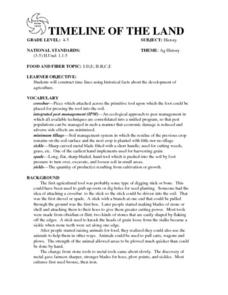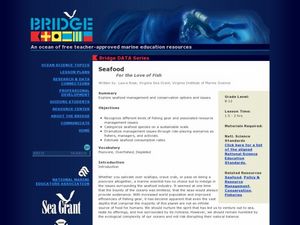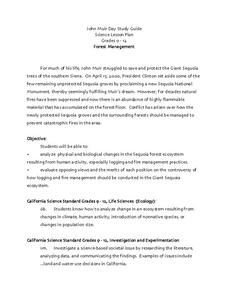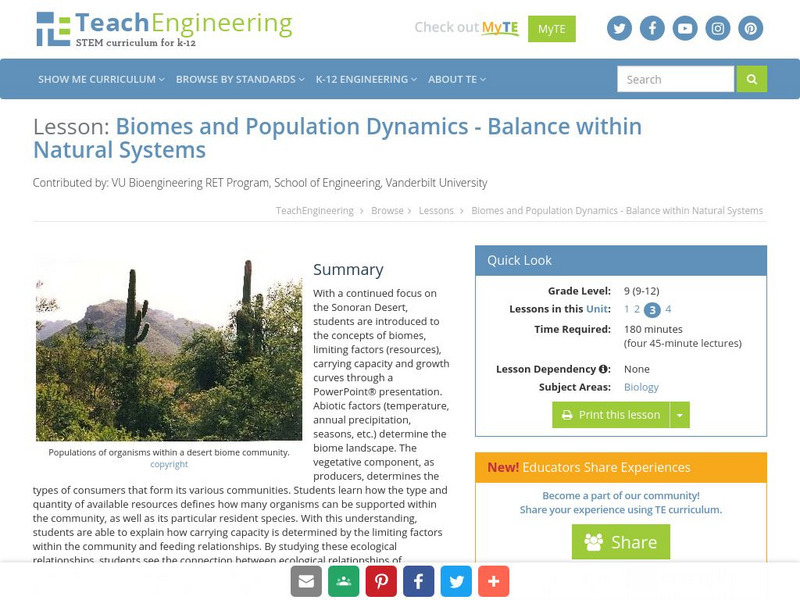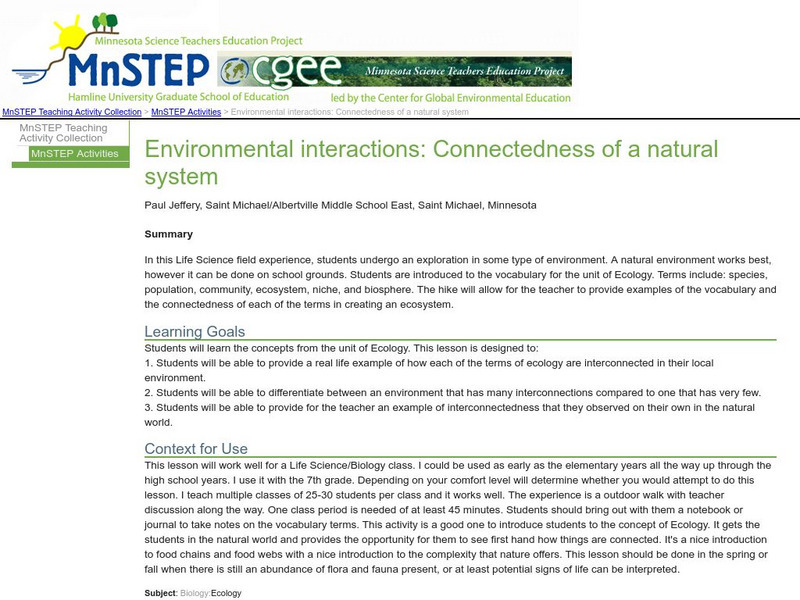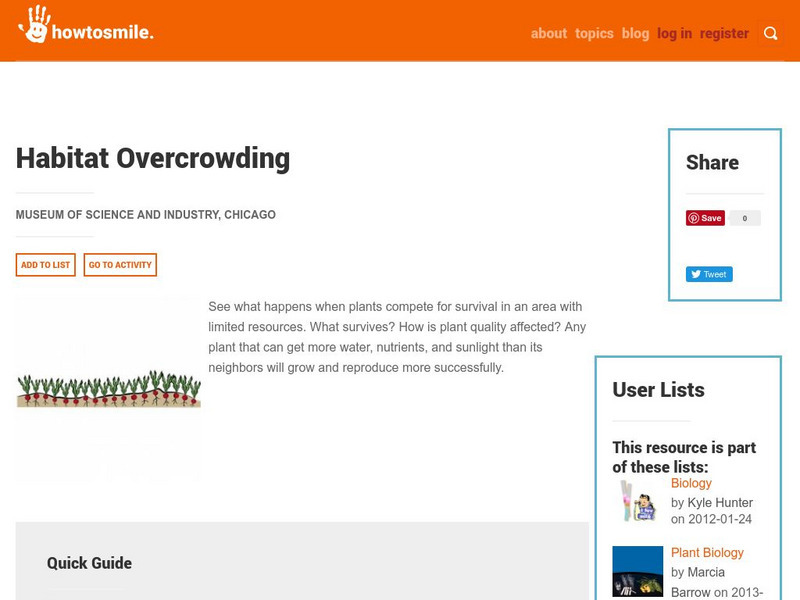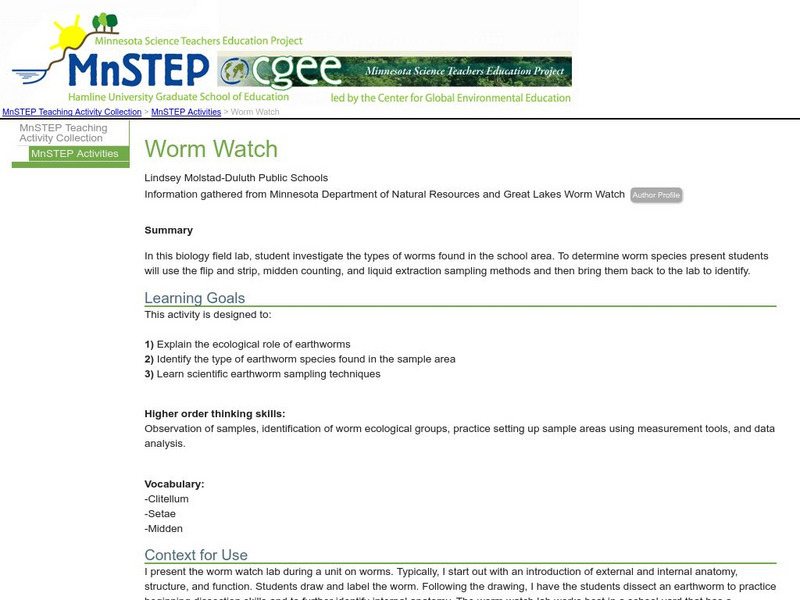Curated OER
Water Use and Conservation
Students discuss the different types of water found on Earth. They discover why not all water is used for drinking and calculate how much water they use. They create their own water conservation plan.
Curated OER
The Arctic and Taiga Ecozone of Canada
Students discover the differences in the Arctic and Taiga regions of Canada. They identify physical and human characteristics of both region. They also practice using an atlas.
Curated OER
"Honey Dew from Bunny Too!"
The students will design a lab to test the mechanism that triggers spore dispersal. They should have some clues after making observations of the life cycle. Part of the fun here is to let the students devise a method for testing this...
Curated OER
Lotic Environment Lesson Plans
Pupils create and conduct experiments on a "classroom river habitat." They manipulate the biotic and abiotic factors so that they are able to compare an artificially prepared river model to a naturally occurring lotic ecosystem.
Curated OER
The Arctic and Taiga Ecozone of Canada
Young scholars examine the various sub-regions of the Arctic and Taiga zones in Canada. Using the online Canadian Atlas, they locate and describe the characteristics of each zone. They organize their information into a chart and share...
Curated OER
Making a Food Web and Learning About Ecosystems
Third graders examine the difference between a food web and food chain. They also examine the importance of the sun in a food web and food chain. Students understand what happens when you remove parts of the chain.
Curated OER
How do new species form?
Tenth graders conduct a critical analysis of current evolutionary concepts. They describe how scientists continue to investigate theories. Students examine examples with experimental data that suggest alternative methods of species...
Curated OER
Journey of the Salmon
Third graders predict salmon migration routes and explore how dams affect the salmon migration. They explore the cultural significance of salmon to the Nez Perce people and design technology to aid salmon migration.
Curated OER
The Appaloosa - Horse of the Nez Perce
Fourth graders investigate the use of Appaloosa horses by the Nez Perce Native Americans during the War of 1877. They examine the geography of the area and determine why the Appaloosa horse was suited to this use after looking at...
Curated OER
What is Migration
Students conduct individual research and participate in discussion be able to identify difference between forced and voluntary migration. They identify if push and pull factors are caused by political, social, economic, or environmental...
Curated OER
TIMELINE OF THE LAND
Students construct time lines using historical facts about the development of agriculture. Students research specific dates and events and report their findings to the class. Students tape or glue the sections together sequentially in a...
Curated OER
Seafood: For the Love of Fish
Students role play a scenario specific to decision making in seafood management and conservation. In this marine science lesson, students estimate seafood consumption in their state. They recommend new regulations for better fishery...
Curated OER
Forest Management
Young scholars explore the changes in the Sequoia forest ecosystem. They evaluate reasons for the changes and discuss opposing views of human activity, logging and fire management practices. Students observe a video, describe the...
TeachEngineering
Teach Engineering: Biomes and Population Dynamics
This lesson begins with a PowerPoint slideshow that covers important ecological concepts about biomes, limiting factors, carrying capacity, and population growth. Students will look at the population dynamics involved with the diversity...
Science Education Resource Center at Carleton College
Serc: Investigating the Ecology of Goldenrod Galls Through Biological Sampling
In this biology field lab exercise, students conduct a stationary population study of goldenrod galls. They examine a host of factors including goldenrod plant density, goldenrod gall density, gall height, gall mass, larval exit hole...
Science Education Resource Center at Carleton College
Serc: Population Growth, Ecological Footprints, and Overshoot
In this three-part activity, students apply linear, exponential, and rational functions to explore past and projected U.S. population growth, carbon footprint trend, ecological overshoot, and effectiveness of hypothetical carbon dioxide...
Texas Instruments
Texas Instruments: Jason: Island Fox: A Population in Trouble
Examine the relationship between the island fox and golden eagle populations on Santa Cruz Island over a twelve-year period using the TI-73 Explorer to graph and analyze the values.
Science Education Resource Center at Carleton College
Serc: Environmental Interactions: Connectedness of a Natural System
A field experience where students undergo an exploration in a natural environment. They are introduced to the concepts of species, population, community, ecosystem, niche, and biosphere.
Other
My Science Box: Ecosystem Organization
In this lesson, learners will learn about the different levels in the hierarchy of ecology and explain the relationships: organism, population, community, ecosystem, biome, and biosphere. They will also discover why different regions...
Other
National Science Digital Library: Smile: Habitat Overcrowding
Experiment with crowd control in a garden. Students will test what happens to radish plants observing who survives, who gets the most food, water and sunlight.
American Geosciences Institute
American Geosciences Institute: Earth Science Week: Mapping a Refuge
An observation-based investigation for students while visiting a national wildlife refuge.
Science Education Resource Center at Carleton College
Serc: Mn Step: Worm Watch
For this field investigation, students use sampling techniques to identify the types of earthworms found in the schoolyard. Data will be combined for the whole class to get a snapshot of the earthworm population, species, and ecological...
Other popular searches
- Human Population Ecology
- Population Ecology Lab
- Community Ecology Population
- Biology Population Ecology
- Plant Population Ecology
- Population Ecology Plants
- Population Ecology Webquest
- Population Ecology Bacteria
- Population Ecology Web Quest
- Uk Population Ecology
- Population Ecology Graphing
- Census Population Ecology










